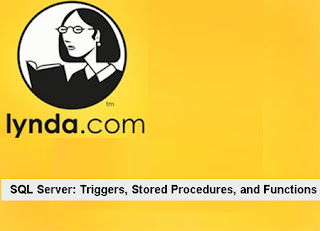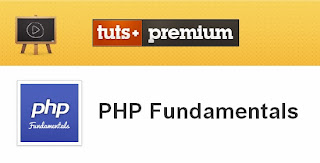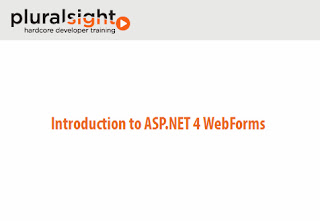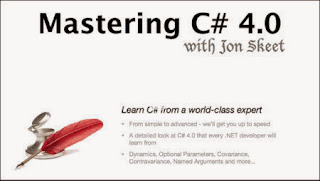Installing Apache, MySQL, and PHP with David Gassner describes
how to install and configure Apache HTTP server, MySQL database server,
and PHP, known as the AMP stack, on a local development computer.
Chapters are devoted to multiple installation approaches: installing the
components separately on both Windows and Mac (including coverage of
Apache and PHP on Mac OS X 10.7 Lion), installing the pre-packaged
Apache and MySQL distributions in WampServer on Windows and MAMP on Mac,
and installing the cross-platform XAMPP and Bitnami on both Mac and
Windows. Exercise files are included with the course.
Monday, December 30, 2013
Installing Apache, MySQL, and PHP
Saturday, December 28, 2013
SQL Server 2012 New Features
SQL Server 2012 is the first cloud-ready information platform for
Microsoft. In this course, author Martin Guidry explores its new
possibilities, showing you how to protect, unlock, and scale the power
of your data, and work with a variety of devices and data sources. The
course also provides an overview on obtaining, installing, and running
SQL Server 2012 and will be of immense interest to anyone considering
upgrading or installing this latest edition.
Wednesday, December 25, 2013
Monday, December 16, 2013
Saturday, December 14, 2013
Friday, December 13, 2013
HTML5, CSS3, and jQuery with Adobe Dreamweaver CS5.5

Tuesday, December 10, 2013
Lynda – SQL Server: Triggers, Stored Procedures, and Functions
This course investigates several key database-programming concepts: triggers, stored procedures, functions, and .NET CLR (Common Language Runtime) assemblies. Author Martin Guidry shows how to combine these techniques and create a high-quality database using Microsoft SQL Server 2012. The course also covers real-world uses of the INSERT, UPDATE, and DELETE procedures, and how to build a basic web form to connect to your database.
Sunday, December 8, 2013
SQL Server: Myths and Misconceptions
Learn the truth about common SQL Server myths applicable from SQL Server 2005 onwards. There is so much information online about SQL Server, however much of it is inaccurate to some degree. In this course, you will learn the truth behind more than 80 myths and misconceptions about SQL Server that can cause you performance and availability problems – from someone who wrote the SQL Server code. This course is perfect for developers and DBAs who have been struggling to make sense of conflicting information about SQL Server. The information in the course applies to all versions from SQL Server 2005 onwards.
Saturday, December 7, 2013
PHP with MySQL Beyond the Basics
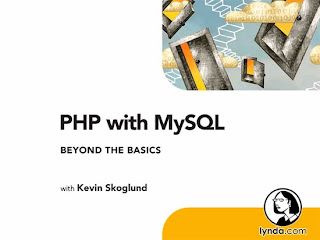
Sunday, December 1, 2013
FIFA 2014 - Black Box V2
FIFA 2014 Minimum System Requirements
OS : Windows XP, Windows Vista or Windows 7 Or
Windows 8
Processor : 1.8 GHz Core 2 Duo
RAM : 2GB RAM for Windows Vista & Windows
7/8
Disc Drive : DVD-ROM at 8x Speed
Hard Drive : 8.0 GB, with additional space
required for saved games and DirectX 9.0c installation
Video : 3D accelerated 256 MB video card with
support for Pixel Shader 3.0
Minimum Supported Video Cards: ATI Radeon HD
3600, NVIDIA GeForce 6800GT
Sound Card : DirectX 9.0c Compatible
DirectX : 9.0c
Input : Keyboard, Mouse, Dual Analogue gamepad,
VOIP Headset
Online Multiplayer : 2-22 players, 512
kbits/sec or faster
Single System Multiplayer: 2-5 players on 1 PC
Tuesday, November 26, 2013
Intermediate Oracle 11g Course
This Intermediate VTC course expands on the Introduction to Oracle 11g
course. It gives you a more detailed grass roots knowledge of Oracle SQL
and Oracle PL/SQL. Author and expert Gavin Powell covers a wide range
of topics including many types of queries, expressions, and statements.
He also explores sequences, synonyms, views, materialized views, user
access and security, working with indexes, and the basics of programming
with PL/SQL. As with the introductory course, this intermediate course
is not focused on Oracle Certification but will give you a good start
towards some more advanced aspects of coding SQL and PL/SQL. To begin
learning today, simply click on the movie links.
Sunday, November 24, 2013
PHP Fundamentals
So you have learned the basics HTML and CSS and are now ready to dig into building your own dynamic websites. Congratulations for getting this far; now it is time for the fun part! In this course, I will teach you, from scratch, how to use PHP; we will also, naturally, have to learn a bit of MySQL in the process!
Friday, November 22, 2013
Introduction to ASP.NET 4 WebForms
This course introduces you to building applications with ASP.NET 4 WebForms, starting with installing the tools and finishing with a complete Web application. Building Application with ASP.NET 4 WebForms is a course designed to get you up and running with ASP.NET WebForms. The modules in the course will cover everything from setting up a development environment to deploying to a live web site. In between we’ll drill into the details of server controls, data binding and validation, user controls, security, Ajax features, and persisting data to SQL Server.
The Fundamentals of Ruby
Are you ready to be escorted to the wonderful world of Ruby development? If so, this is the course for you! This course start from scratch, as we learn the ins and outs of the language, and how it compares to other languages that you might be familiar with, like PHP. If you would like to join me, let is get started!
Wednesday, November 20, 2013
Ruby on Rails Tutorial: Learn Web Development with Rails, 2nd Edition
The Ruby on Rails Tutorial, 2nd Edition book and screencast series teach you how to develop and deploy real, industrial-strength web applications with Ruby on Rails, the open-source web framework that powers top websites such as Twitter, Hulu, GitHub, and the Yellow Pages.
The Rails Tutorial screencasts contain dozens of tips and tricks to help you go beyond the Rails Tutorial book, including debugging hints, test-driven development techniques, and solutions to many of the book’s exercises (view a sample video or some free screencasts). And though the screencasts are carefully edited, I’ve left in some of the problems I encountered along the way, so that you can learn how to recover from the inevitable application errors – and see that even experts sometimes make mistakes.
Saturday, November 16, 2013
Introduction to the ASP.NET Web API
In the world of HTML5, mobile devices, and modern development techniques, HTTP has become the default option for building rich, scalable services. The ASP.NET Web API was designed from the ground up to meet the need of developers who want to build HTTP/RESTful services. The API provides an easy-to-use set of default options, while providing a deep extensbility infrastructure to meet the demands of any scenario using HTTP.
Tuesday, November 12, 2013
Android App Development with Java Essential Training
Android App Development with Java Essential Training is a comprehensive look at the Android architecture that teaches how to build and deploy applications for Android phones and tablets using the Java programming language. Starting with the installation of the required developer tools, including Eclipse and the Android SDK, the course covers how to build the user interface, work with local data, integrate data from the accelerometer and other sensors, and deploy finished applications to the Android Market. Exercise files are included with the course.
Up and Running with Java Applications
 |
Introducing PHP
PHP is the most popular server-side language used to build dynamic
websites, and though it is not especially difficult to use,
non-programmers often find it intimidating. This workshop from author
and trainer David Powers is designed to change that by teaching you PHP
through a series of clear, focused, easy-to-follow lessons. After
briefly explaining what PHP is and how it integrates with HTML, David
will guide you through the setup and configuration of a PHP development
environment on both Windows and Mac OS X. Then you’ll learn the features
of the PHP language through a series of hands-on exercises before
embarking on a larger project that involves building a script to
validate and email user input from an online form. Through this project
you’ll come to understand the value of creating reusable code, the
importance of PHP security, and how to deal with multiple-choice form
fields.
Monday, October 28, 2013
Dev Apps C# 2008: Enterprise, Mobile, and Security
This course moves your development skills even further beyond the basics, starting with learning how to extend Visual Studio 2008 and handling issues you will encounter with multiple versions of assemblies and applications. You will learn to create and debug Windows services, and how to create and test applications for Windows Mobile devices. You will become expert working with XML, reading and writing data using the XML DOM and the XML reader/writer classes. Visual Studio 2008 adds new data-related features—you will learn about these new features, and also how to create new custom controls, secure applications, and create setup applications so you can deploy your solutions. You will finish by learning how to analyze code at runtime using attributes and reflection, and how to use the new Visual Studio 2008 client application services.
C++ Advanced Topics
 |
C# Design Strategies
This production is In Process which means we are actively recording new episodes. There are 10-12 episodes planned, currently, but there might be more. In this advanced series, Jon Skeet (of Stack Overflow fame) dives into various strategies and patterns you might want to consider when building your application. Topics covered include core Gang of Four design patterns such as the Singleton, Strategy, State and others as well as good habits such as using interfaces, Dependency Injection and Inversion of Control.
Rob and Jon have a habit of going off on small tangents – and we have a habit of recording what Jon goes off on. In addition to the core episodes, we’ll also be releasing outtakes – such as Jon writing his own IoC container from scratch!
This is an advanced series and understanding of C# and how it works is a very good idea.
Professional C# Part2
Learning object-oriented programming is an obstacle that many beginning developers struggle with, and for good reason: It involves getting your head around a whole new approach to solving problems. In this workshop, professional developer Edward Tanguay teaches you object-oriented programming in a unique way. He introduces a real-world problem and shows two approaches to it, one object-oriented and one not. The non-object-oriented approach works at the beginning, but then you see as you progress along this path that adding features becomes increasingly difficult. Then he shows you the object-oriented approach, and you see how the structure of the code is different and how this allows you to add new features with ease. You’ll also learn about new features of C# 4.0 such as the very welcome named and optional parameters as well as the fabulously simple new COM Interop feature to help you read and write Excel files from C#.
Professional C# Part1
The C# language has evolved tremendously over the past ten years and if you are going to master it you will need to learn many aspects of this rich technology. In this workshop, professional developer Edward Tanguay begins with the basics that you will recognize from other languages, such as if, switch, foreach, and so on. You will also learn about important concepts such as the heap and the stack, extension methods, and creating and consuming events. In the later parts of the workshop, Edward shows you more advanced features unique to C# such as extension methods, generics, and data access with LINQ. If you like, you can follow up this workshop with “Professional C#, Volume 2: Object-Oriented Programming & New Features in C# 4.0.”
Sunday, October 27, 2013
J2EE For Developers
TekPub – Mastering C# 4.0 with Jon Skeet
If you’re just learning Microsoft’s flagship language – or if you’ve been at it for years – this production will teach you a lot. Jon Skeet is well-known as the “Chuck Norris” of StackOverflow.com with inhuman skills when it comes to answering questions about C# 4.0. Tap his brain and learn the language like never before with our all-new series.
Friday, October 25, 2013
Lynda - Data-Driven Presentations with Excel and PowerPoint
Learn how to drive your Microsoft PowerPoint presentations with data
straight from the source—Excel. Gini Courter first shows you how to use
conditional formatting to highlight important data, summarize data with
PivotTables, and visualize your data with sparklines and charts. Then
learn how to leverage the linking and embedding features of Office to
bring Excel tables and charts into PowerPoint. Gini then uses SmartArt
to provide a conceptual framework in PowerPoint and animates the
results. Finally, learn to create links from PowerPoint to Excel to fire
up a workbook directly from a presentation. If you've wondered how to
create compelling, data-driven presentations that always stay up to
date, this course is for you.
Subscribe to:
Comments (Atom)
About
Contact Form
Copyright © 2013 TOTdownload.com
Designed By Blogger Templates






